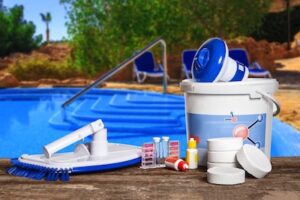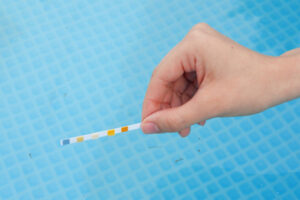Mastering Pool Maintenance: Essential Tips for a Clean and Safe Pool
Are you tired of spending hours scrubbing your pool, only to end up with cloudy water and pesky debris floating around? If so, it’s time to master the art of pool maintenance. In this article, we’ll share essential tips that will help you keep your pool sparkling clean and safe for a refreshing swim.
So, get ready to dive into a world of pool care knowledge!
Importance of Regular Pool Maintenance
Maintaining a clean and safe pool is crucial for several reasons. Firstly, regular maintenance helps to keep the water free from contaminants, such as bacteria and algae, ensuring a healthy swimming environment. Secondly, proper maintenance extends the lifespan of pool equipment, such as filters and pumps, reducing the need for costly repairs or replacements. Lastly, a well-maintained pool enhances the overall aesthetics of your backyard, creating an inviting space for relaxation and entertainment.

Pool Maintenance Essential Tips for a Clean and Safe Pool
Maintaining a pool requires a combination of regular tasks and preventive measures. By following these essential tips, you can master pool maintenance and enjoy a clean and safe pool throughout the swimming season.
1. Reguarly Test the Water
Maintaining proper water chemistry is the foundation of effective pool maintenance. Keeping the pool water chemically balanced is crucial to avoid various issues like algae growth, cloudy water, and skin irritations. Invest in a reliable Spa and Pool Water Testing app to measure pH levels, chlorine, alkalinity, and other chemical levels. But ensure the app is quick and provides accurate test results. Plus, it should have personalized recommendations to make weekly water care easier and more convenient than ever.
Make it a habit to regularly test the water at least once a week to ensure the levels of chlorine, pH, alkalinity, and calcium hardness are within the recommended range and adjust the chemicals accordingly to keep the water sparkling clear, and safe.
2. Balancing the Chemicals
Once you have tested the water, it’s important to balance the chemicals accordingly. Adjust the pH levels by adding either pH increaser or pH decreases as needed. Maintain an appropriate level of chlorine to keep the water sanitized and free from harmful bacteria. Additionally, monitor and adjust alkalinity and calcium hardness to prevent corrosion and scale buildup.
3. Skimming and Cleaning the Pool
Regularly skim the surface of the pool with a net to remove leaves, debris, and insects. Empty the skimmer baskets and clean the pool filter to ensure optimal water circulation and filtration. It’s also essential to brush the walls and floor of the pool to prevent the buildup of algae, mold growth, and other contaminants.
4. Vacuuming and Backwashing
Use a pool vacuum to remove dirt and debris from the bottom of the pool. Pay special attention to hard-to-reach areas, such as corners and steps. If you have a sand or DE (diatomaceous earth) filter, periodically backwash it to remove trapped particles and maintain efficient filtration.
5. Regularly Maintain the Filtration System for Clear and Hygienic Water
A well-functioning filtration system is the heart of a clean pool. The pool pump and filter work together to remove impurities and debris from the water, ensuring it remains clear and hygienic. Check the filter regularly, backwash it when necessary, and clean the skimmer basket.
If your pool has heavy usage, you should run the filtration system for extended periods. However, during colder months or low usage, you can reduce the filtration time to save on energy costs. Regularly maintaining the filtration system ensures optimal performance and extends its lifespan.
6. Maintaining Proper Water Level
Monitor and maintain the appropriate water level in your pool. Too low a water level can damage the pump, while too high level may result in inefficient skimming and filtration. Use a garden hose to adjust the water level accordingly.
7. Monitor and Maintain Proper Water Circulation
Proper water circulation is essential for preventing stagnant water, algae growth, and the buildup of debris. Ensure that the pool pump and filter are in good working condition and schedule regular maintenance and cleaning as needed. Consider running the pool pump during off-peak hours to save on energy costs.
8. Regularly Shock the Pool
Shocking the pool involves adding a high dose of chlorine or other pool shock products to eliminate contaminants and maintain water clarity. This process is particularly important after heavy usage or during periods of hot weather. Follow the manufacturer’s instructions and safety guidelines when using pool shock products.
9. Use a Pool Cover
Invest in a high-quality pool cover to protect your pool when it’s not in use. A pool cover helps to prevent debris from falling into the water, reducing the need for frequent skimming and cleaning. It also helps to retain heat and reduce water evaporation, saving energy costs. During the off-season or extended periods of non-use, a pool cover protects your pool from the elements and reduces the need for extensive cleaning.
Ensure the cover fits snugly and securely to get the maximum benefit. For added safety, consider a pool safety cover that can support a person’s weight, preventing accidental drowning incidents.

Frequently Asked Questions (FAQs)
How often should I test the water chemistry?
It is recommended to test the water chemistry at least once a week. However, during periods of heavy usage or after heavy rainfall, it’s advisable to test the water more frequently.
Can I use household bleach instead of pool shock?
No, it’s not recommended to use household bleach as a substitute for pool shock. Household bleach may contain additives and chemicals that are not suitable for pool use. Always use products specifically designed for pools.
How often should I backwash the pool filter?
The frequency of backwashing depends on several factors, including the size of the pool, filter type, and the amount of debris in the pool. As a general guideline, backwash the filter when the pressure gauge reads 8-10 psi above the normal operating pressure.
Should I drain my pool during winter?
In most cases, it’s not necessary to drain the pool completely during winter. However, you should lower the water level below the skimmer and take appropriate measures to protect the pool from freezing temperatures, such as using a pool cover and winterizing chemicals.
How can I prevent algae growth in my pool?
Regularly shock the pool, maintain proper water circulation, and monitor the water chemistry to prevent algae growth. Additionally, brush the walls and floor of the pool regularly and ensure the pool cover is used when the pool is not in use.
How can I save on pool maintenance costs?
To save on pool maintenance costs, consider investing in energy-efficient pool equipment, such as variable-speed pumps and LED pool lights. Maintain proper water chemistry to prevent damage to pool equipment and reduce the need for costly repairs. Additionally, practice regular maintenance tasks, such as skimming and cleaning, to prevent larger problems that may require professional intervention.
Conclusion
Mastering pool maintenance is essential for keeping your pool clean, safe, and inviting. By following these pool maintenance essential tips and guidelines outlined in this article, you can ensure that your pool remains a refreshing oasis throughout the swimming season. Remember to test and balance the water chemistry, clean and skim the pool regularly, and implement preventive measures to protect your pool from contaminants and environmental factors. With proper maintenance, your pool will be a source of enjoyment for years to come.
